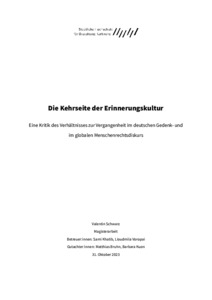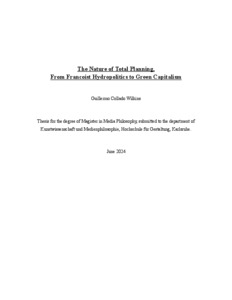Valentin Schwarz
| Name | Valentin Schwarz |
3 Inhalte
- Seite 1 von 1
Die Kehrseite der Erinnerungskultur
- Titel
- Die Kehrseite der Erinnerungskultur
- Titel (en)
- The Other Side of Erinnerungskultur
- Untertitel
- Eine Kritik des Verhältnisses zur Vergangenheit im deutschen Gedenk- und im globalen Menschenrechtsdiskurs
- Autor/in
- Beschreibung (de)
- In dieser Arbeit setze ich mich mit unterschiedlichen Geschichtsbegriffen auseinander. Dafür dienen mir die Diskussionen um die deutsche Erinnerungskultur als Einstiegspunkt. Das Ziel ist es allerdings nicht, unmittelbar in die polarisierte Debatte einzugreifen. Stattdessen richtet sich der Fokus auf das ideologische Fundament, das verschiedenen Formen, mit der eigenen Geschichte umzugehen, zugrunde liegt. Den theoretischen roten Faden bildet das Werk "After Evil" des Philosophen Robert Meister. Darin kritisiert er die Haltung, die Vergangenheit zwar als schlimm zu verurteilen, aber gleichzeitig auch als abgetrennt von der Gegenwart zu betrachten. Herausgearbeitet werden die Argumente unter anderem anhand von Filmen von Alexander Kluge und Harun Farocki.
- Beschreibung (en)
- In this work, I examine different concepts of history. The discussions surrounding the German culture of remembrance serve as my starting point. However, the aim is not to intervene directly in the polarized debate. Instead, the focus is on the ideological foundations that underlie different ways of dealing with one's own history. The work “After Evil” by philosopher Robert Meister forms the theoretical leitmotif. In it, he criticizes the position of condemning the past as evil, but treating it at the same as something that is separated from the present. The arguments are elaborated on the basis of films by Alexander Kluge and Harun Farocki, among others.
- In this work, I examine different concepts of history. The discussions surrounding the German culture of remembrance serve as my starting point. However, the aim is not to intervene directly in the polarized debate. Instead, the focus is on the ideological foundations that underlie different ways of dealing with one's own history. The work “After Evil” by philosopher Robert Meister forms the theoretical leitmotif. In it, he criticizes the position of condemning the past as evil, but treating it at the same as something that is separated from the present. The arguments are elaborated on the basis of films by Alexander Kluge and Harun Farocki, among others.
- Kategorie
- Typ des Projekts/Werks
- Schlagworte
- Datierung
- 31.10.2023
- Sprache
- Bemerkungen
- Eine kondensierte Fassung des Textes wurde von "Umbau" veröffentlicht: https://umbau.hfg-karlsruhe.de/posts/die-kehrseite…
- Titel
- Die Kehrseite der Erinnerungskultur
- Projektleiter/in
- Semester
- Studiengang
- Typ der Abschlussarbeit
- Importiert am
- 07.06.2024
- Übergeordnete Sets
- 2
- Set enthält
- 0 2
The Nature of Total Planning
- Titel
- The Nature of Total Planning
- Titel (en)
- The Nature of Total Planning
- Untertitel
- From Francoist Hydropolitics to Green Capitalism
- Untertitel des Projekts/Werks (en)
- From Francoist Hydropolitics to Green Capitalism
- Autor/in
- Beschreibung (en)
- To what extent is sustainable development truly sustainable? In which ways is it different from previous ecological regimes, such as the extractivist practices of XXth century authoritarianisms? How do plans, and models, mediate between different temporalities? What can we learn about our social metabolism by studying climate scenarios as political techniques of government?
'The Nature of Total Planning' tries to answer these question by doing a close reading of the environmental history of La Bizkaia, a godforsaken valley in northern Spain. Historicising La Bizkaia’s social metabolism is the first step for a political and epistemological critique of green capitalism. A broader investigation of Francoist hydropolitics contextualises the pine monoculture as part of a national programme to enrol nature into Franco’s political project. The last section of this thesis compares that model with how La Bizkaia is managed today, under the sustainable development paradigm. While, discursively, sustainable development distances itself from the extractivist practices of fascist autarky, 'The Nature of Total Planning' reveals striking continuities in the material practices of La Bizkaia’s forestry management.
- To what extent is sustainable development truly sustainable? In which ways is it different from previous ecological regimes, such as the extractivist practices of XXth century authoritarianisms? How do plans, and models, mediate between different temporalities? What can we learn about our social metabolism by studying climate scenarios as political techniques of government?
- Kategorie
- Typ des Projekts/Werks
- Schlagworte
- Datierung
- 06.06.2024
- Mitwirkende
- Dank an
- Boris Buden
- Nagore Chivite Lizarraga
- Ariana Dongus
- Christian Egerer
- Víctor Fancelli Capdevila
- Max Grünberg
- Sami Khatib
- Jule Köpke
- Barbara Kuon
- Livia Lazzarini
- Iñigo Mazkiaran
- Matteo Pasquinelli
- César Alonso Porras
- Juan José Recalde
- Jess Saxby
- Valentin Schwarz
- Mariana Silva
- Ionel Spanachi
- Iñigo Villafranca Apesteguía
- Lioudmila Voropai
- Sprache
- Ort: Institution
- Stadt
- Land
- Beteiligte Institution(en)
- Internetlinks
- Titel
- The Nature of Total Planning
- Projektleiter/in
- Studiengang
- Typ der Abschlussarbeit
- Importiert am
- 22.10.2024
- Übergeordnete Sets
- 0
- Set enthält
- 0 1
so much water, so close to home
- Titel
- so much water, so close to home
- Autor/in
- Beschreibung (de)
- Als Kind wurde Minh Anh Nguyễn sexuell missbraucht. Mit ihrem 47-minütigen Essayfilm versucht sie, diesen schwierigen Teil ihres Lebens in Worte zu fassen, das Unsagbare auszusprechen und durch die Reflexion und Projektion der filmischen Praxis ein Gefühl für das eigene Selbst zurückzugewinnen. Die Filmemacherin offenbart dabei intime Gespräche mit ihrer Mutter und versucht, den schmerzhaften Prozess zu bewältigen, dieses Trauma an die Öffentlichkeit zu bringen. Mit einer zerbrechlichen Intimität bewegt sich der Film zwischen Fiktion, Archivmaterial und Dokumentation, auf der Suche nach einer Sprache, um das Vergangene auszudrücken und die Zukunft anzunehmen.
- Beschreibung (en)
- As a child, Minh Anh Nguyễn was sexually abused. Her 47-minute essay film is an attempt to put words to this difficult part of her life, to speak the unspeakable and regain a sense of self through the reflection and projection that the act of filmmaking allows. Her film reveals intimate conversations with her mother and tries to overcome the difficult process of making this trauma public. It navigates through a wounded intimacy between fiction, archive footage and documentary in search of a language to articulate the past and embrace the future.
- Kategorie
- Typ des Projekts/Werks
- Schlagworte
- Datierung
- 2025
- Mitwirkende
- Dank an
- Kathrin Beckers
- Kevin Beckmann
- Liam Birtolonu
- Matthias Bruhn
- Phuong Uyen Dao
- Christian Egerer
- Charlotte Eifler
- Kurt Glockzin
- Ute Haag
- Eva Hartmann
- Marine Hugonnier
- Fred Kelemen
- Dane Komljen
- Peter Lütje
- Phuong Thao Luu
- Malik Meyer
- Laura Morcillo
- Hai Nguyen
- Hong Anh Nguyen
- Thanh Long Nguyen
- Ludger Pfanz
- Lars Valentino Pfeiffer
- Christine Reeh
- Caroline Schwarz
- Manuel Sékou
- Thu Thao Tran
- Trinh Ngoc Tran
- Serpil Turhan
- Ha Linh Vuong
- Sprache
- Untertitel (Film)
- Material
- Technik/Verfahren/Formate
- Film
- Dauer
- 46:40 Minuten
- Stadt
- Land
- Beteiligte Institution(en)
- Titel
- so much water, so close to home
- Projektleiter/in
- Semester
- Studiengang
- Typ der Abschlussarbeit
- Externes Archiv
- Importiert am
- 14.05.2025
- Übergeordnete Sets
- 0
- Set enthält
- 0 5


